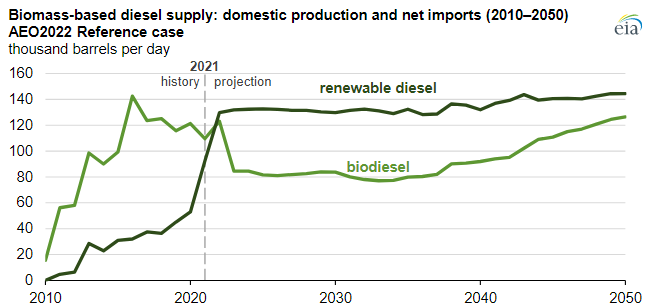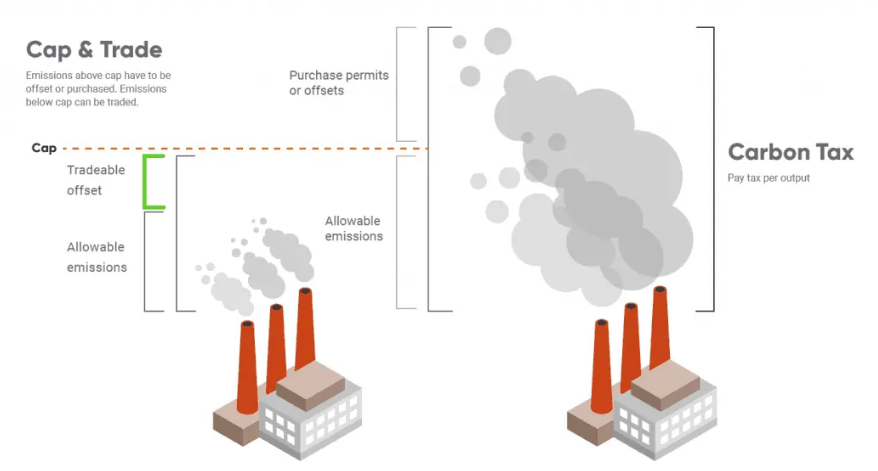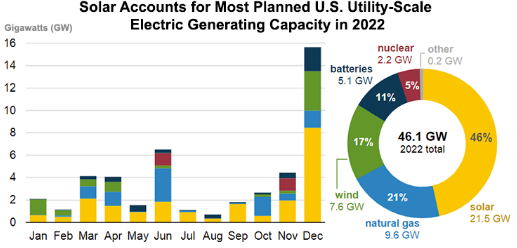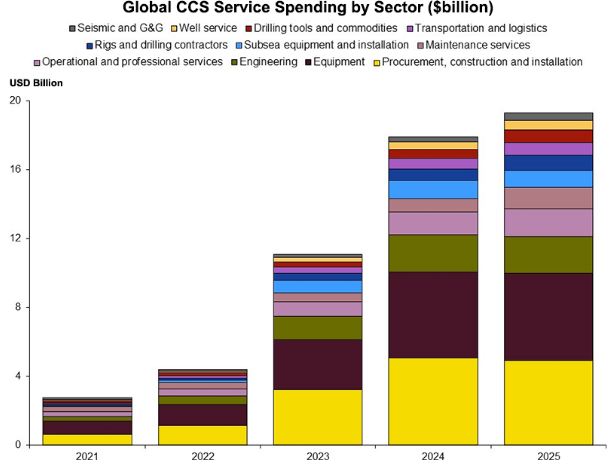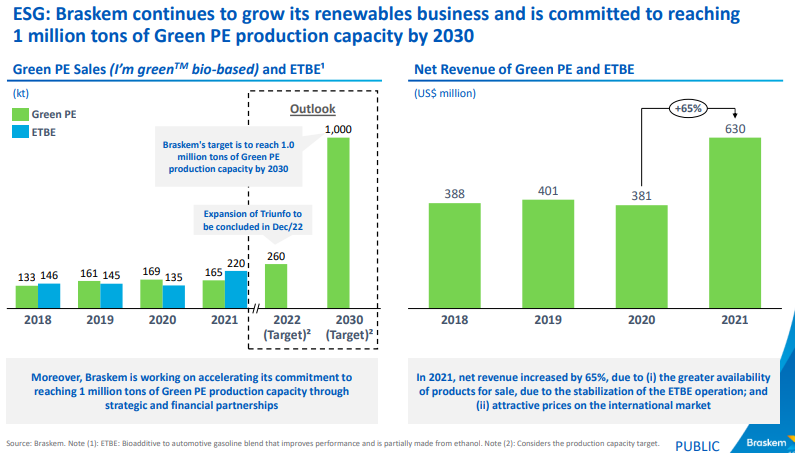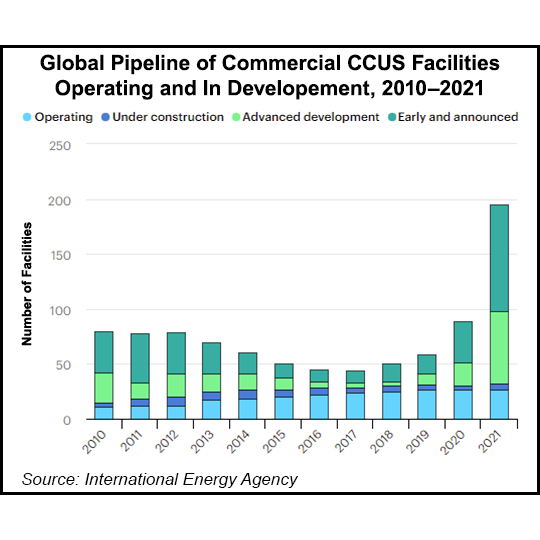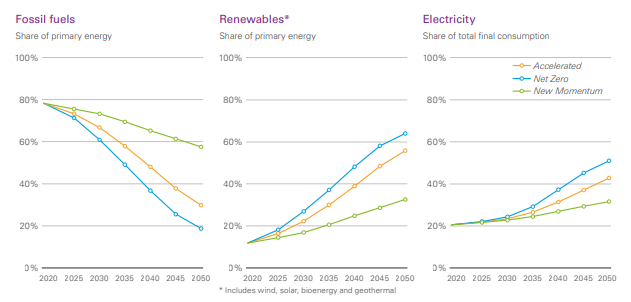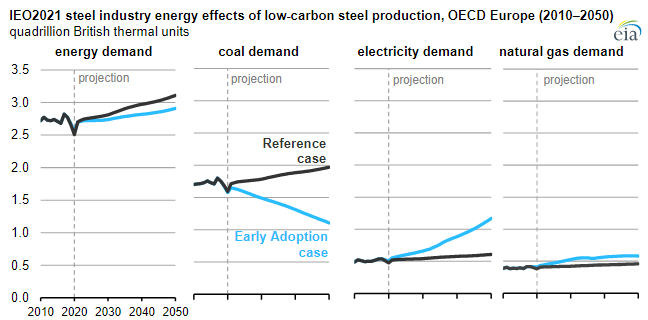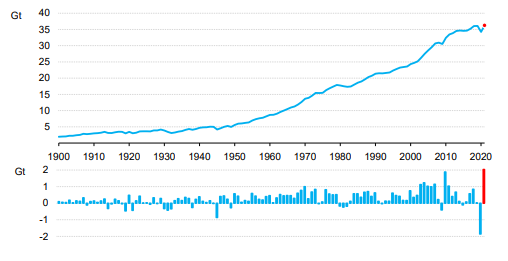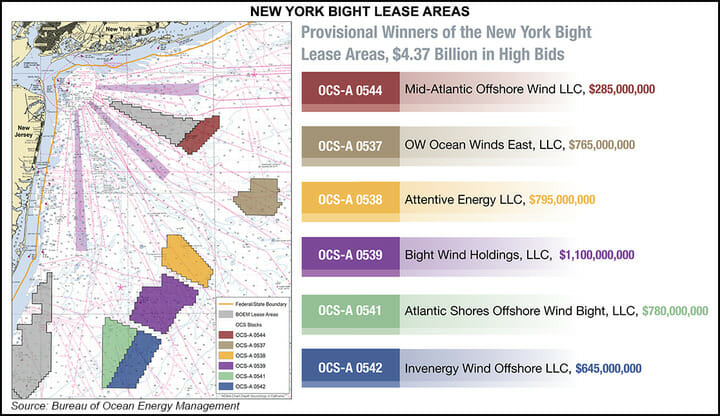The EIA renewable diesel projections are based on a couple of things – who plans to make it and who will pay for it. All eyes are focused on the California market today as that is where the incentive lies – through the LCFS credit – and production plans plateau associated with that opportunity. As other states in the US adopt similar programs – which seems likely – we would expect to see production plans increase and the EIA will likely adapt its market view model and the chart will change. Note the dominance of renewable diesel over time, and this is where we would expect all future growth to occur. The plug-and-play nature of renewable diesel makes it a far more attractive option for refiners assuming the cost works. See more in today's daily report.
Renewable Diesel Will Grow If Other States Adopt LCFS
Mar 25, 2022 2:32:12 PM / by Graham Copley posted in ESG, Hydrogen, Climate Change, Sustainability, CCS, CO2, Energy, power, renewable energy, LCFS credit, EIA, renewable diesel, renewable fuels, power capacity, renewable capacity, CO2 pricing, diesel
Everyone Is Pushing For A US Carbon Policy, Except Congress
Mar 24, 2022 2:54:22 PM / by Graham Copley posted in ESG, Climate Change, Sustainability, Carbon Tax, CO2, Carbon Price, Emission Goals, Inflation, Chemical Industry, Net-Zero, decarbonization, Dow, carbon abatement, carbon emissions, carbon pricing, nuclear power, WPC
There was a very strong focus at the WPC on the need for carbon pricing in the US to facilitate investment decisions around many initiatives focused on carbon abatement. The consensus was very much that a carbon price – so a cap and trade system like they have in Europe – was the best mechanism, and far more likely to drive action and limit inflation than a carbon tax. This is something that we broadly agree with but the US is a bit late to the game and the right caps need to be set so that CO2 prices don’t languish at very low levels for years, as they did in Europe. Jim Fitterling of Dow was somewhat provocative in his comments around nuclear power, but we see this as part of a broader initiative aimed at getting a serious dialogue moving around how we make the practical steps needed to drive carbon lower. Nuclear power provides stable baseload and is carbon-free – a small modular nuclear reactor could generate enough steam and enough power to drive the decarbonization of major chemical complexes – one investment for example could transform one of the larger Dow sites. If we are going to get to net-zero targets without nuclear, we need much more progressive policies – especially around carbon pricing – which is likely the direction that Dow would like to take the discussion.
Renewable Capacity: Likely To Dissapoint
Mar 23, 2022 2:19:27 PM / by Graham Copley posted in ESG, Climate Change, Sustainability, Coal, Renewable Power, Energy, Supply Chain, Oil, natural gas, power, solar, renewable energy, solar energy, Gas prices, renewable capacity, supply chain challenges, Utility, materials costs
The back-end loading of the power projects for the US for 2022, as shown in the chart below leaves us somewhat skeptical concerning how much will come online this year. Supply chain problems and materials costs and availability are causing all sorts of problems with renewable power projects and installed capacity expectations for 2021 were too ambitious. We believe that companies are pushing projected start-ups later in the year to give them more of a chance of completion, but this creates the risk that they slip into 2023 or beyond. The most significant issue here is that as these plans get delayed, natural gas demand goes up, as one of the swing suppliers. This is fine as long as the US natural gas industry and shale oil industry is investing so that gas availability rises. Otherwise, we could see gas prices spike in the US next winter and another year where we use more coal than we expected. For more see this week's ESG and Climate report.
CCS Wont Work Without Policy And Neither Will Energy Conservation
Mar 22, 2022 12:48:43 PM / by Graham Copley posted in ESG, Carbon Capture, Climate Change, Sustainability, CCS, CO2, Energy, Emissions, IEA, Oil, natural gas, clean energy, renewable, fossil fuels, renewable capacity, EPA
One of the subjects that we will cover at length in the ESG and Climate report tomorrow (to be found here) is the significant need for CCS globally, but especially in the US, as we see more balanced forecasts of energy supply emerging which show more use of fossil fuels for longer – especially, but not limited to natural gas. These forecasts recognize the current energy momentum as well as some of the more practical realities around the rate of construction of renewable capacity relative to energy demand growth. The CCS plans that are appearing all over the place are nothing more than plans right now and if the EPA permit activity is a true barometer – not much has moved beyond planning. This needs to change and we likely need both an increase in CCS incentives – which could take many forms – as well as some streamlining around the permitting process. Simply waiting and hoping for a renewable miracle is not going to work – nor is some sort of CCS cost breakthrough.
Green Polyethylene Will Be Important But Costs Will Matter
Mar 18, 2022 11:39:46 AM / by Graham Copley posted in ESG, Polymers, Climate Change, Sustainability, Polyethylene, Ethylene, packaging, ethanol, renewable polymers, renewables, Braskem, crude oil, sugar cane, sugarcane
Braskem’s green polyethylene is an interesting niche opportunity, but we question how big the market might be for a product where you need the buyer to agree to prices that cover your costs – i.e. how many buyers will potentially pay up. In a $100 per barrel crude oil environment, polyethylene from sugar cane likely looks quite attractive, but probably less so in a $50 crude environment. Sugar cane-based ethanol has a cost advantage over corn-based ethanol, and one of the key questions for Braskem is how do you grow the business outside Brazil, where the barriers to entry for others are not much different. We do not doubt the demand potential for green polyethylene and other ethylene derivatives, but our concerns would be how to profitably grow the business, especially if there is a lower crude oil price backdrop. Today it is easy to make a bull case for oil – we do so above – but note that oil forecasting is not our strength and nor is it anyone else’s – based on hindsight. Paying a 20% premium over fossil fuel-based polymers may make sense for some packagers with meaningful ESG goals, but a 100% premium is likely unstable.
Lots Of Needed CCS Waiting For The Right Incentives
Mar 17, 2022 12:23:31 PM / by Graham Copley posted in ESG, Carbon Capture, Climate Change, Sustainability, CCS, CO2, IEA, 45Q, CCUS, Denbury
The CCS chart below is one that we have shown before and we make the same observations again as little has changed on the “action” side. The number of facilities under discussion, advanced or otherwise, continues to rise – see the Denbury announcement below, for instance - but very little is moving to the construction phase. While in the US this is in part a permitting issue, with the permit process taking several years, once you have a site plan, we get the sense that everyone is waiting for a more supportive incentive program – either a large CO2 penalty (tax) or an increased incentive – such as increasing the 45Q value. MOUs are being signed with landowners – as is the case with Denbury – and potential offtake partners, but very little cash is going out of the door for any of the US projects yet. Given the EIA analysis above, it would seem critical that something is done to move these projects from planning to action fairly quickly – if the US is going to need CCS at scale in 15-20 years, we need to start down that learning curve now. For more see the energy section of today's daily report.
bp Analysis Shows Steep Challenges Of Energy Transition
Mar 15, 2022 11:36:51 AM / by Graham Copley posted in ESG, Climate Change, Sustainability, Energy, Emission Goals, Net-Zero, bp, renewable energy, renewables, energy transition
The annual review of World energy from bp shows a stark reversal of the company’s position only a short while ago. When the pandemic hit, bp went on record suggesting that we may have seen peak oil demand in 2019. It was an interesting theory and one that we discussed at the time, but it underestimated the impact that aggressive COVID-related stimulus would have on consumers globally and we suspect that bp, like many others, overestimated the rate at which renewables could be added. Now the company is exploring a very different scenario, one in which the current momentum in the energy market continues and the rate of renewable additions slows, either because of more limited capital or because of material constraints – or a combination of both.
Green Steel: The Real Deal!
Mar 11, 2022 12:36:55 PM / by Graham Copley posted in ESG, Hydrogen, Climate Change, Sustainability, Green Hydrogen, Renewable Power, renewable energy, steel, Green Steel
The steel analysis below is interesting because it is likely that a significant bifurcated market will develop for steel as the demand for green steel is likely to be significant, although probably not at any price, while there will also be a few opportunities to make low-cost green steel and the lucky few could make a lot of money. Anecdotally, we are helping a client look for the best use of what could be a substantial tranche of low-cost renewable power in a location that is not heavily populated, and consequently, there is a limited local demand for the power or anything you might make from it, such as hydrogen. Green steel has come up as possibly the best use of the power in a couple of conversations so far. This adds another wrinkle to the question of whether we can build renewable power fast enough – especially to meet some of the green hydrogen expectations. The challenge will be fending off potentially higher bidders for the power, and green steel is a real contender – more so if a reasonable premium can be gained in the market for the steel. See more in today's daily report.
Source: EIA – Today In Energy, March 2022
2021 CO2 Emissions Levels - The Result Of Too Much Hope
Mar 10, 2022 2:27:05 PM / by Graham Copley posted in ESG, Climate Change, Sustainability, CO2, Renewable Power, Energy, Emissions, carbon dioxide, renewable energy, renewable investment, manufacturing, CO2 emissions, weather, energy supply, energy demand
The IEA CO2 emissions data is not a surprise as it has been telegraphed for a while by several commentators that the world went backward in 2021. There were several causes, not least of which was an economy which, with the benefit of hindsight, was overstimulated, pushing up demand for resources in general, including energy. There has also been an overestimation of the rate of investment in renewable power, something which is finally gaining attention more generally, triggered by the energy supply fears that have emerged from the Russia/Ukraine conflict. It will take time to make the very large investments needed to abate the CO2 associated with industrial and consumer activity and there is no overnight fix. Accommodative policies are needed today for investments that will start a decline in emissions several years from now.
Renewable Power Urgency Complicated By Material Availability
Mar 8, 2022 1:49:00 PM / by Graham Copley posted in ESG, Climate Change, Sustainability, Coal, Energy, natural gas, solar, renewable energy, power demand, manufacturing, wind, EIA, reshoring, offshore wind, raw material, battery
We include a couple of headlines and charts in today's daily report that step into the central theme of this week’s ESG and climate report, which will be published tomorrow (see here). The offshore wind ambitions and the EIA solar and battery projections both assume that the materials are available to build the capacity. In the case of the offshore wind leases, the winning bidders do not need to be in the market for all of the projects today and while the opportunities will lead to a step-change in demand for turbines in the US, the timing is less clear today that it will be in a few months and that timing may be adjusted to reflects equipment timing and costs, etc.


